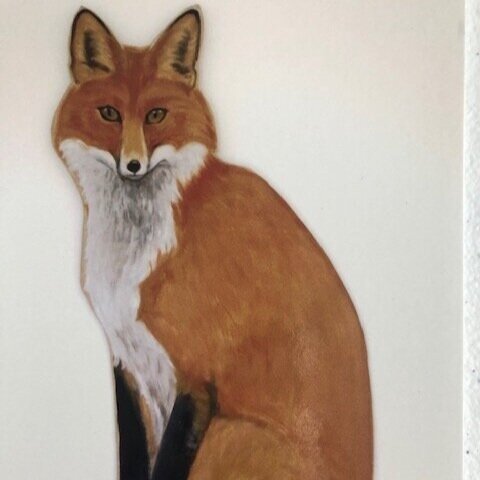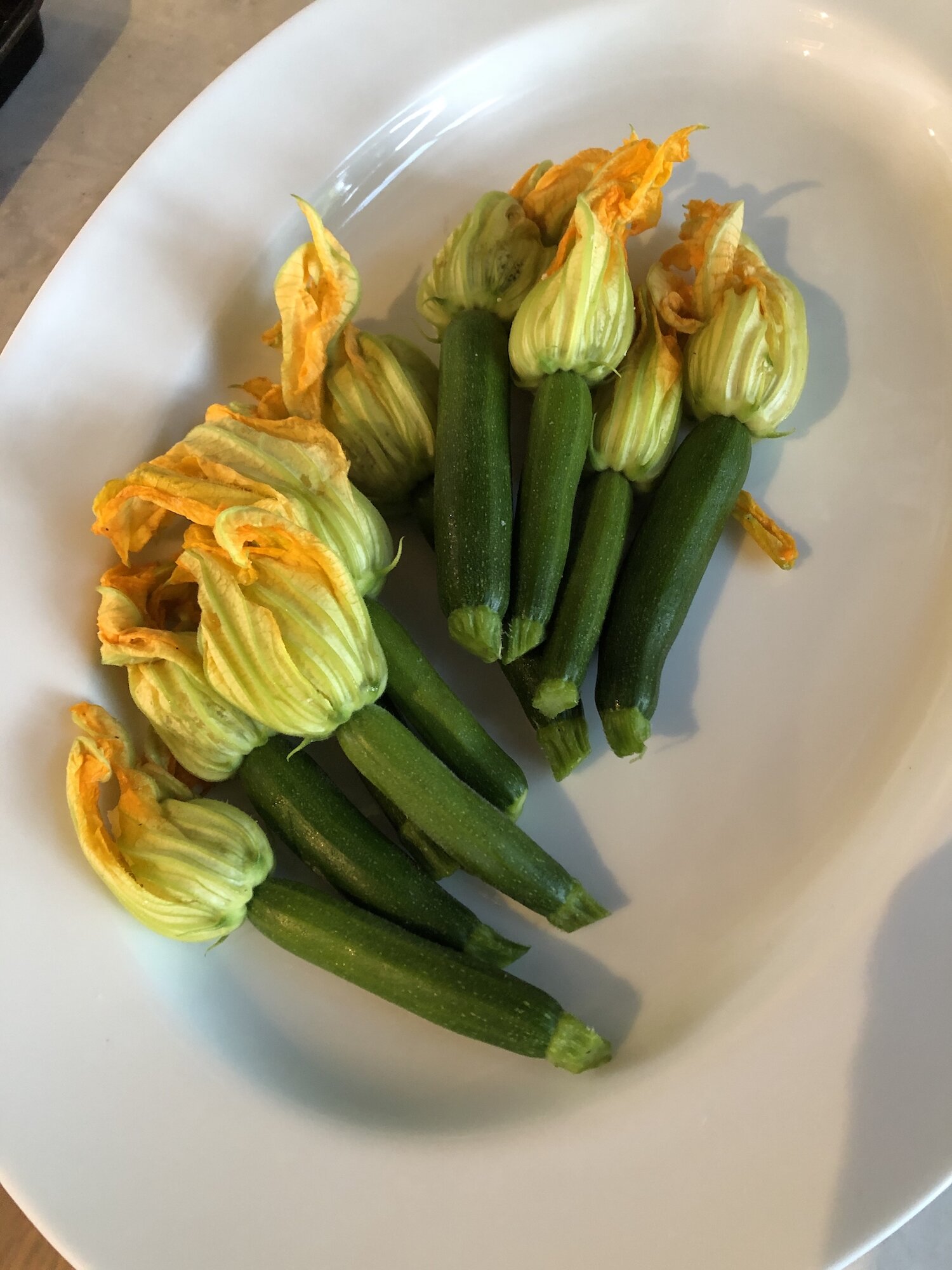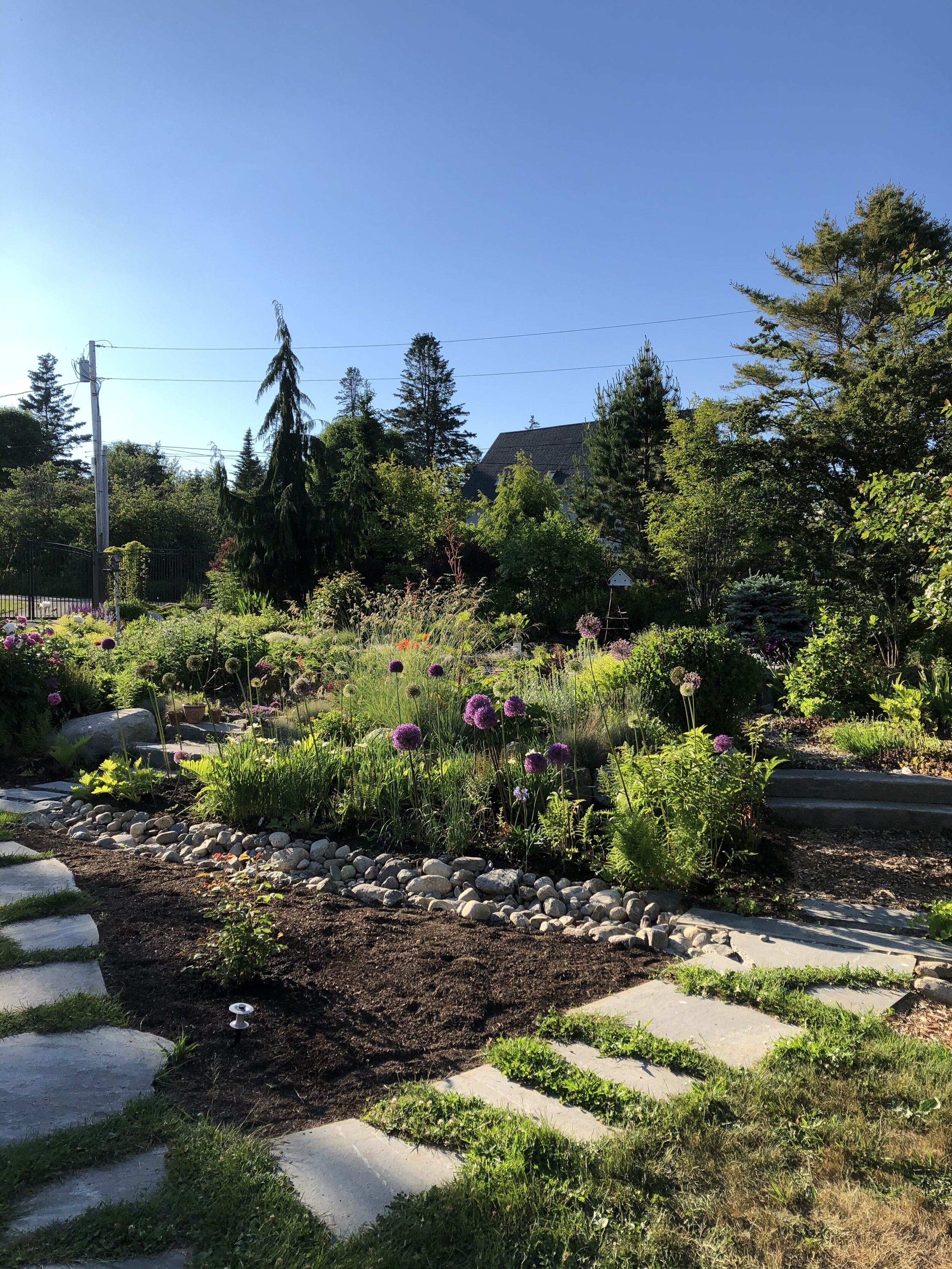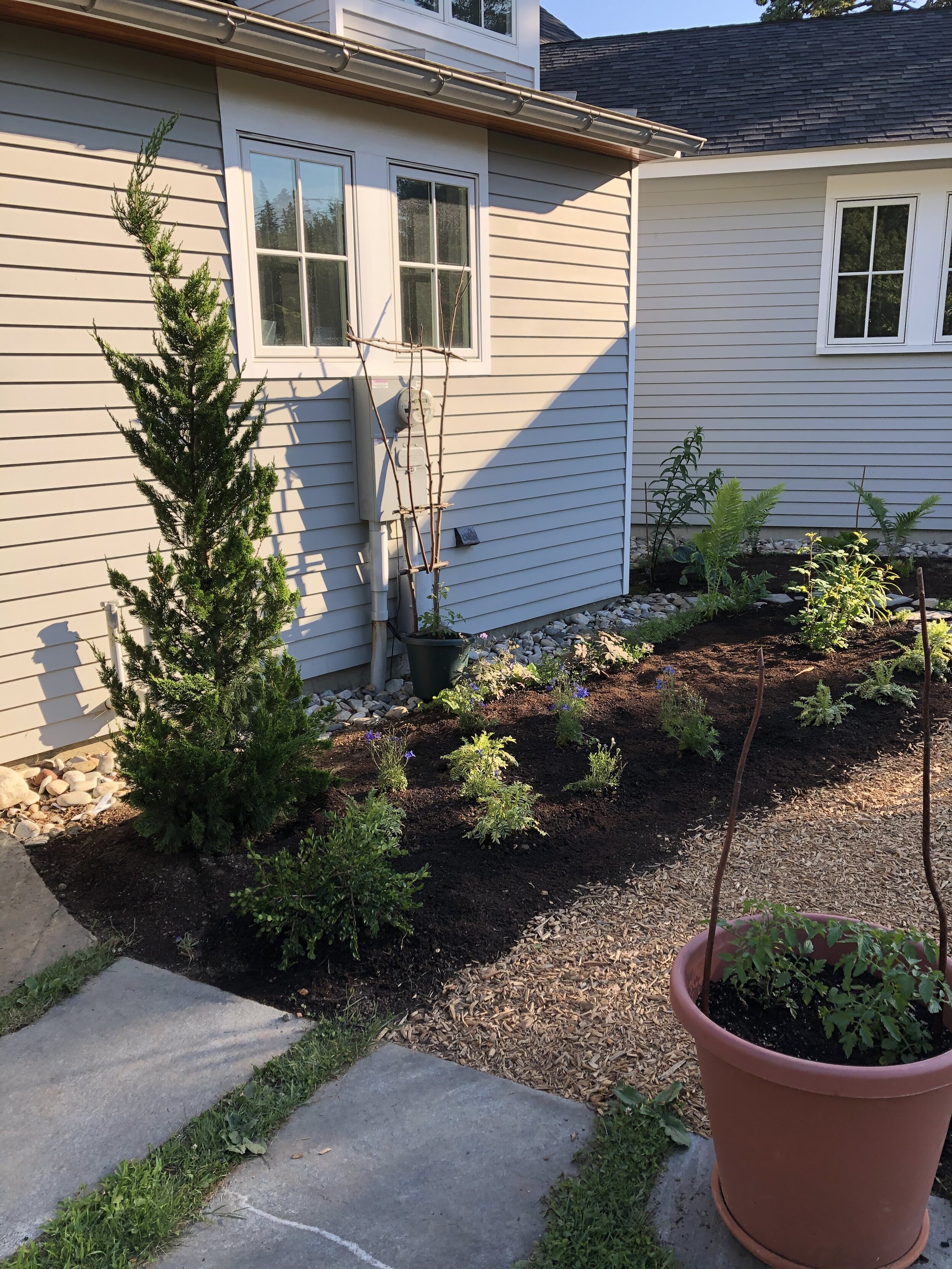Voodoo in Owls Head
“Fox” by Maine painter Phoebe Bly.
It’s a big day here in Owls Head. A delivery of some 200 new plants is due to arrive by truck from a major nursery in Connecticut. I get up early, put on my garden gear - long pants, long sleeve shirt, hat, gloves, and boots - and head out.
The garden welcomes me with scents culled by the morning dew: rich, earthy compost, musky monarda, sweet roses, and salvia. Shadows and sunlight create too many shades of green to count or describe. Making my rounds I check on the seedlings in the new cold frame I built this year. It’s amazing to watch pale green specks peeping out of black plastic pots, insignificant bits that will become an expanse of zucchini with broad, ruffled leaves and a tempest of yellow flowers. I will pick the flowers, clean them, stuff with anchovy and buffalo mozzarella, dip in pastella, a batter of flower and sparkling water, and fry. In a boozy reverie, I drink the garden’s beauty and wonder like a fine wine, until BAM, a jarring sight nearly sends me off balance. In my cold frame, partially buried in the drainage pebbles, is a stiff, white, scaly foot/claw of a chicken.
The new cold frame.
Squash blossoms, waiting to be stuffed with anchovies and Buffalo mozzarella.
I stare nonplussed, taken aback at first by its disturbing shape, how the claw is curled inward, and then the length and sharpness of the nails, but quickly I am wondering what the hell it’s doing in my cold frame! I call to Wayne, our handyman extraordinaire who is working today, and ask him to please come see.
Wayne, is that a chicken foot?
Ah yup, he replies in distinctive Maine drawl.
He reaches in and grabs the ghostly white foot that is, we discover, attached to a large, partially de-feathered drumstick. Something –a fox, a coyote? – has stored its prize for safekeeping and maybe even curing in the cold pebbles. Recently I have found other remains in the garden, like a small skull and tail of some animal, but nothing this big or gruesome. Wayne suggests the garbage, but I carry it at arm’s length in a firm pinch-hold past our driveway to the other side of the road. I toss it near a weedy culvert where I have seen a fox and her kits. Perhaps they will find the chicken and finish what they started, giving the chicken a more honorable end, as nature intended, than a black garbage bag.
Still, the affair has distressed me. I feel sorry for the creatures who lost their lives in my garden, like somehow I’m responsible. I find my husband and share the news, how my little flower world seemed so lovely and harmless when in fact, nature has shown its darker side. He says no, it’s voodoo. A mysterious force at play.
He turns out to be right. The rest of the day is cursed.
The plants coming from Connecticut were selected and ordered by landscape architect Denise Hoffman-Brandt. I met Denise at Bartram’s Garden ten years ago when we hired her as part of a team to create a master plan for the world-famous botanic garden. Her work was extraordinary; I never stopped dreaming of working with her on a garden of my own someday. My wish came true: we are now in the fourth year of implementing our own major plan for my garden in Maine. Typically, Denise comes up to guide the construction and plantings, but this year, because of the Coronavirus, she could not. We have been working remotely with emailed plans and phone calls.
This year’s plan includes five new garden beds that will be filled with high bush blueberry, Mukdenia, iris germanica, cornus, campanula, delphiniums, monarda, lilies, grasses, peonies, and more. Most are native perennials with some exotics mixed in for color and texture, and complement what we have planted so far. Melina, the wonderful gardener who works with me, is a professional with her own business and a number of clients. She is coming to help today. I am lucky to have her fine sensibilities and expertise of native plants. She is also very beautiful; her mother is from Colombia. I’m telling you this because it’s part of the story, as you will see.
Images L to R: New bed planted, so far, with one David Austin rose, Charlotte; New bed to the left of the house planted with a Hollywood Juniper, Jacob's Ladder, and lilies; Poppies in contrast with Schubertii allium, ferns, and Coal Steam iris; Grasses and Himalayan rhubarb.
Something else you need to know is that we live in Knox County, on the St. George peninsula: Owls Head is at one end and Port Clyde (famous Wyeth territory) is at the furthest point south. To reach our house you get off the main highway, Rt. 73, (a two-lane road) and take Ash Point Drive (a lesser two-lane road with no shoulder), onto the peninsula. The road is wide enough to accommodate large trucks because the Knox County Airport is here (for private jets and Cessnas) but once you pass the airport a sign warns: No Turn Around. This is because when you get to the very end of Ash Point Drive, where we live (on a one-car lane), it dead-ends into the ocean. A small, scenic pull-over has enough space for a car or two and even an SUV loaded with kayaks but that’s it. Nothing as big as what I now see coming down the road: a huge 18-wheeler.
The truck stops at the intersection of the lane to my house and Ash Point and parks in the right lane. As I start walking toward the truck, the driver gets out, paperwork in hand, and comes toward me. He is wearing a mask so I can’t see his expression but, as he gets closer, I sense he is agitated (understatement).
Carlos, the driver, is in a small panic. He doesn’t say hello, or ask if he is in the right place; he just tells me he doesn’t know how to turn around. And then he asks if I have a forklift.
A forklift? I repeat, astonished. This is a residence, not a commercial property.
He shrugs, like it’s my problem. He’s not worried about getting the ten flats of plants out of his truck, he is only worried about turning around and getting the hell out of there.
My old director instincts kick in and I make a plan: get plants off truck; call sheriff. I go back and tell Melina we have to manually unload the plants. She jumps into action and drives her truck so that its bed faces the back of the nursery truck that has – another discovery – no hydraulic lift. Carlos motions that she needs to unload the plants herself and she firmly motions back no, that is not her job. Unloading, apparently, is not Carlos’ job either, but he soon realizes his options are limited if he wants to get the hell out of there.
Melina and Carlos start unloading and I go back to the house to contact the Knox County sheriff’s office. I call the nonemergency number and explain the situation to the dispatcher. She says she’ll send someone right out. It happens all the time she says, people don’t read the sign. Right.
The sheriff arrives pretty quickly, just in time to direct a few cars that are trying to get around the 18-wheeler to either get to their residences or to the dead-end and its scenic views of the Atlantic Ocean, just a few feet away. I can see why Carlos was panicked, picturing his truck plunging head-first into the water, tires sticking out, much like the chicken foot in my cold frame.
When I go to talk to the sheriff the first thing I ask is if he knows how to drive a truck. I am making a joke but his stiff expression tells me joking is a bad idea. I quickly switch gears and explain the predicament. The driver, I tell him, does not know how to turn around. The sheriff raises his eyebrows. Any truck driver worth his salt can get out of there, he says, as if everyone in Maine knows this and I should too. This fact was later confirmed by Wayne who said even he could turn an 18-wheeler around on a 24-foot wide road.
But Carlos is not from Maine and only knows highways and big mall parking lots, the kind where you’d find a Lowe’s Garden Center with a forklift and no “No Turn Around” Signs. I also find out later that Carlos, smitten by her beauty, hits on Melina and wants to know if she is married. (When I told Melina I was going to write about this she begged me, to save her dignity, to describe him as a handsome Latino hulk. He wasn’t). The sheriff, now joined by my husband, waits until we remove the last of the plants and put them in our driveway which now, quite ironically, actually looks like a Lowe’s Garden Center, without the forklift.
The sheriff is doing his best to direct but Carlos, as far as I can tell, is not paying any attention and is doing things his way, going back and forth and not getting anywhere. At one point his air pressure system quits, causing him to stall and wait until it will function. Did I mention that it is hot? Neither Melina nor I want to stand in the sun and watch the debacle so we go back to the garden and start the job of sorting and organizing our new plants. In the background we hear the beep beep beep of the truck’s reverse, and the continuous blast-air brakes which drive us, out of curiosity, to see what is happening.
Melina in the garden.
I watch with bated breath as Carlos backs out; there are already ruts on the right side of the road from a previous vehicle mishap caused by our housekeep last winter. While Carlos succeeds in backing up, has done so by driving onto the lawn of our neighbor to the left of the lane. With the good sheriff’s help, and the additional advantage of having half of his truck in our neighbor’s lawn, Carlos manages to turn around. I feel bad for him and offer to give him something for his trouble if he can wait a minute while I run back to the house. He doesn’t want to wait. He barely waves good-bye. Carlos and his truck crawl up the road, much like a dying man searching for water in a desert. I imagine he’d rev the engine if he could but at least he’s getting the hell out of Owls Head. Hands on my hips I survey the damage: matching ruts in the neighbor’s lawn, on both sides of our road, like a curse.
Melina and I have a good laugh, especially after I tell her about the chicken foot in the cold frame and she tells me about the marriage proposal. We start digging and planting, placing plants in the new beds designed by Denise. It’s easy to see how everything and nothing changes: trucks will turn around; chickens will lays eggs; the fox will feed her kits and my garden will grow.









